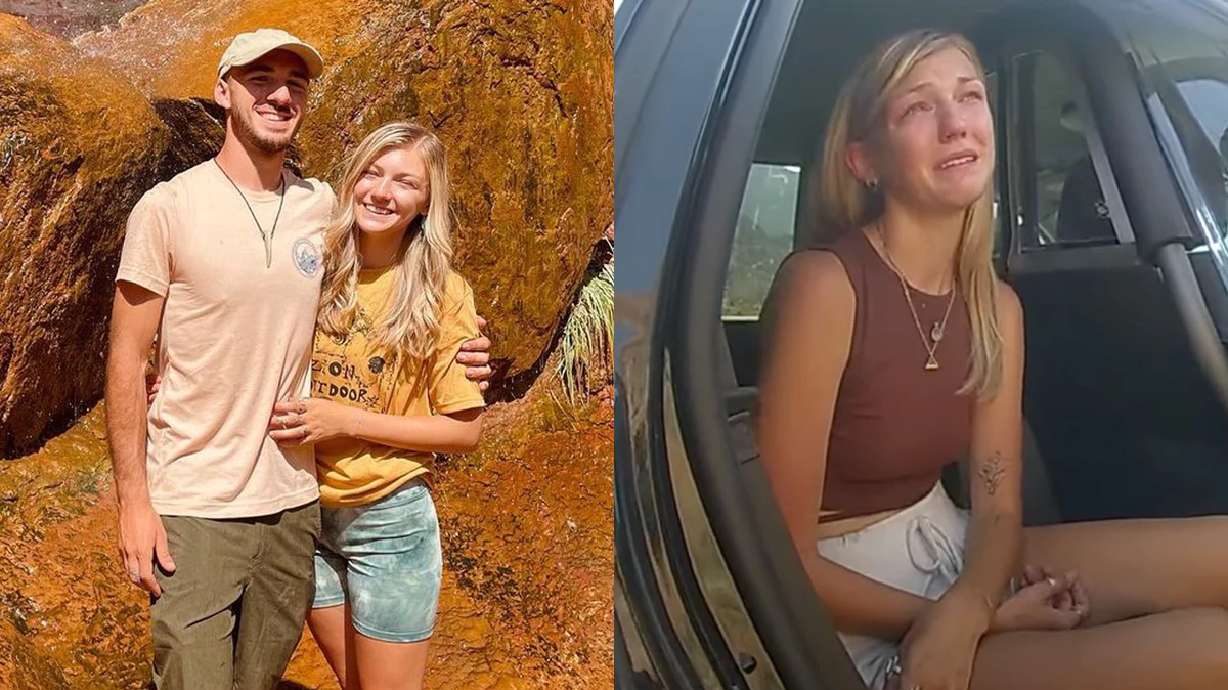Estimated read time: 4-5 minutes
This archived news story is available only for your personal, non-commercial use. Information in the story may be outdated or superseded by additional information. Reading or replaying the story in its archived form does not constitute a republication of the story.
MOAB — An independent investigation revealed that officers with the Moab Police Department made "several unintentional mistakes" in how they handled an Aug. 12, 2021, encounter with Gabby Petito and her fiancee, Brian Laundrie, before Petito's murder.
The 102-page report, which was prepared by Capt. Brandon Ratcliffe of the Price City Police Department, investigators concluded that the officers "failed to cite Ms. Petito for domestic violence."
"The city acknowledges that this finding may raise questions, and the issue is examined extensively in the investigative report," Moab City said in a Wednesday statement included with the investigative report.
Petito and Laundrie traveled in their van from New York in early July before making their way to Utah and Wyoming. The two were pulled over in Moab on Aug. 12 after police received a report the two were fighting outside the Moonflower grocery store. Police noticed Laundrie driving erratically and pulled them over, leading officers to interview each of them.
Petito was last seen alive in Grand Teton National Park in late August. Laundrie returned home to Florida on Sept. 1, 2021, and Petito was reported missing on Sept. 11. She was found dead near the national park on Sept. 19. Laundrie was found dead in October, in what police ruled a suicide.
In a conclusion to the report, Ratcliffe writes that there are many "what-if's" associated with the investigation, mainly the question of whether or not Petito would be alive if police had acted differently.
"There were mistakes made in how this case was handled," Ratcliffe wrote. "If this case was handled flawlessly, would it have changed anything? Nobody knows."
Ratcliffe further wrote that he is confident that the mistakes that were made by two members of the Moab police — officers Eric Pratt and Daniel Robbins — were not made intentionally. They both believed that, at that time, they were making the right decisions.
Detailed in the report are multiple instances of Moab police failing to abide by state law and Moab police policies, including the department's guidelines on domestic violence cases.
According to Utah state code, if an officer responds to a domestic violence call and has probable cause to arrest, they must make the arrest or issue a citation. This did not take place during the traffic stop of Petito and Laundrie's van, meaning the officers involved had violated state law.
The report also points out that an unnamed man called 911 dispatchers and reported he saw "the gentleman slapping the girl" and the two "ran up and down the sidewalk" where "he proceeded to hit her." However, police did not make contact with the man outside of the 911 call, and no formal statement or interview was done.
Among many policy violations, the report indicated that both officers involved in the encounter with Petito and Laundrie engaged in acts that bring "discredit to this department," a violation of Moab police guidelines.
Though the investigation concluded that neither of the officers knowingly made mistakes, Ratcliffe recommended that the two, at a minimum, be placed on probation or have any ongoing probation extended. One of the officers was in training at the time of the incident, and Ratcliffe says that officer must have his field training reviewed and complete additional field training.
Further, Ratcliffe recommended additional training in the fields of writing reports and domestic violence investigations, as well as more training on Utah laws and statutes and an overall policies review. He also recommended that a follow-up interview with the 911 caller be completed.
In the conclusion to the investigation, Ratcliffe wrote that while he believed Petito was the main aggressor in this specific incident, that doesn't mean she was the predominant aggressor in the relationship.
"There have been many times in my career where someone who we know from past experience to be a long-term victim of domestic violence, gets arrested for committing an act of domestic violence against their long-term abuser," Ratcliffe wrote. "Despite knowing the history of those involved, we have had to make a decision based on the information presented to law enforcement at the time, despite our personal feelings and the known history of the relationship.
"It's very likely Gabby was a long-term victim of domestic violence, whether that be physically, mentally, and/or emotionally."










